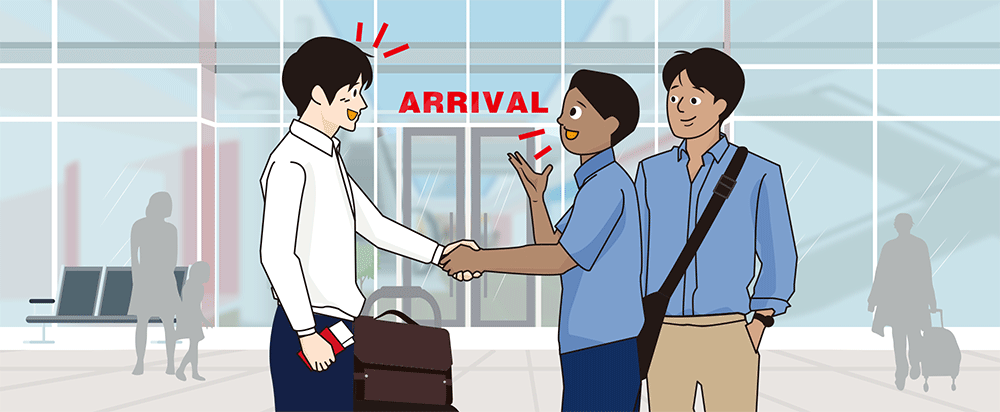Today's Point
今日のポイント他にも、We sing.「私たちは歌います」、He works for a bank.「彼は銀行に勤めています」のように使います。これらは「動作」を表しています。for a bankは修飾語です。
なお、〈主語+動詞+目的語〉の形は、They speak French.「彼らはフランス語を話します」、I drink coffee every morning.「私は毎朝コーヒーを飲みます」のように使います。それぞれ「動作」を表していますね。every morningは修飾語です。

中島健太郎(通称ケン)は大手自動車メーカー、ハヤブサ・モータース社の若手営業マンです。
ケンは、セブにあるフィリピン支社に海外赴任することになりました。
マクタン・セブ空港に到着すると、同僚のジェームズとホセが迎えに来ています。
ジェームズとの再会に喜ぶケン。
そして、「セブに住んでいます。」というホセと、初対面の挨拶を交わします。
今日から、いよいよケンのセブでの生活が始まります。

Story of the Day
今日のストーリーRepeat after your teacher.
先生の後に続けて言ってみましょう。
| Ken : Hello, James. | ケン : やあ、ジェームズ。 |
|---|---|
| James : Hi, Ken! | ジェームズ : やあ、ケン! |
| James : It's nice to see you. | ジェームズ : また会えて嬉しいよ。 |
| Ken : Nice to see you, too. | ケン : 僕も。 |
| James : This is my colleague, Jose. | ジェームズ : こちらは同僚のホセだよ。 |
| Ken : Hello. My name is Kentaro Nakajima. | ケン : こんにちは。中島健太郎と言います。 |
| Ken : You can call me Ken. | ケン : ケンと呼んでください。 |
| Jose : Hello, Ken-san. I'm Jose. | ホセ : こんにちは、ケンさん。ホセです。 |
| Jose : It's nice to meet you. | ホセ : はじめまして。 |
| Ken :Nice to meet you, too! | ケン : はじめまして! |
| Jose : Are you from Tokyo, Ken-san? | ホセ : 東京の出身ですか、ケンさん? |
| Ken : Yes, I am. How about you? | ケン : ええ。ホセさんは? |
| Jose : I live in Cebu. | ホセ : セブに住んでいます。 |
| Jose : But I'm originally from Manila. | ホセ : でも、もともとはマニラの出身です。 |
| Ken : I see. | ケン : そうなんですね。 |
Key Phrase
キーフレーズRepeat after your teacher.
先生の後に続けて言ってみましょう。
I live in Cebu.
Vocabulary / Expressions
ボキャブラリーと表現Repeat after your teacher.
先生の後に続けて言ってみましょう。
| colleague(名詞) | 同僚 |
|---|---|
| call(動詞) | 呼ぶ、電話する(名詞)電話 |
| originally(副詞) | もともとは |
| I see. | そうなんですね。なるほど。わかりました。 |
Exercise
エクササイズ ARead the conversation aloud with your teacher. Fill in the blanks with a, b and c.
After that, fill in the blanks with your own words and practice the conversation with your teacher.
下記の会話の空欄に、a, b, cそれぞれの言葉を入れて、先生と一緒に音読してみましょう。
そのあと、空欄に入る言葉を自分で考えて、先生と会話をしてみましょう。

| Jose : I live in ________ (a. New York b. Bangkok c. Seoul). But I'm originally from New Delhi. | ホセ : 僕は(a.ニューヨーク b.バンコク c.ソウル)に住んでいます。でも、もともとはニューデリーの出身です。 |
|---|---|
| Ken : ________ (a. I understand. b. Is that so? c. Uh-huh.) | ケン : (a.わかりました b.そうですか c.へえ)。 |
Exercise
エクササイズ B (Vocabulary Building)Choose the correct word from the box.
空欄に当てはまる言葉を選んで文章を完成させてください。
- colleague
- call
- originally
- I see
- This animal is ________ from China.
- Her ________ is at the station now.
- A: I am studying art. B: ________.
- I’m David. Please ________ me Dave.
Exercise
エクササイズ CSituation : You are talking with your friend. Talk about where you both live.
ロールプレイ : 友人と話しています。お互いどこに住んでいるか話し合ってください。


Extra Exercise
Try the Extra Exercises. As with Exercise A, become familiar with some of these more advanced phrases.
エクストラ・エクササイズに挑戦してみましょう。
エクササイズAと同じ要領で、より高度なフレーズを練習してみましょう。
| Sato: You did a (a. great b. excellent c. awesome) job with that presentation! |
|---|
| Ken: Thanks! I feel very good about it. |
| Sato: Did you guys celebrate? |
| Ken: Yes. James, Jose, and I went out for drinks. We had a (a. good time b. blast c. great night out). |
| Sato: Good. You didn’t drink too much, did you? |
| Ken: No. Not at all. |
| Jose: Well... Actually... |
| Ken: We better go, Jose! We got work to do! |

- feel good about ~は「~に満足している」という意味。他にも、I feel good about myself.「私は自分に満足しています→自信を持っています」のように使います。
- you guysは「君たち」「あなたたち」という意味。youのみよりも、カジュアルな感じになります。
- We better go.は、We had better go.のhadが省略された形。had better~は「~する方がいい」「~すべきだ」という意味で、「~」には動詞の原形がきます。